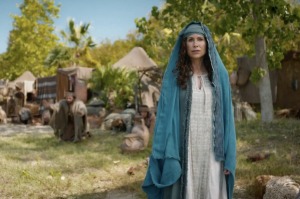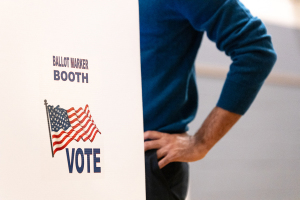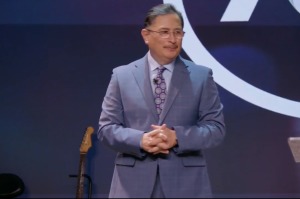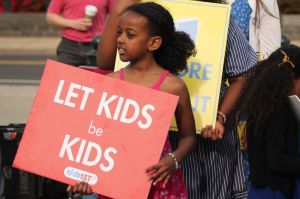UMC Affirms Current Stance Against Homosexual Ordinations
On Friday April 29, the highest judicial body of the United Methodist Church ruled that the practice of homosexuality is a chargeable offense for clergy, and that the denomination’s Book of Discipline, which clearly states that practicing homosexuals are not fit to serve as clergy, is the codified law of the UMC.
The April 29 ruling, which overwhelmingly supported the statement that the Book of Discipline’s statement that "the practice of homosexuality is incompatible with Christian teaching” is “unambiguous,” followed the highly publicized trial and acquittal of the openly lesbian pastor Karen Dammann in March.
Upon the dismay of the majority of Methodists around the world, a twelve-member clergy jury voted that although Dammann is an openly avowed practicing lesbian who lives with her partner, she is fit to serve. In a March 20 statement, the jury voted overwhelmingly that Dammann was innocent and that the Book of Discipline is “ambiguous” in its wording on the subject. Following the controversial verdict, the jury was severely criticized for having placed the denomination’s Book of Discipline on trial, rather than using the Book of Discipline as the standard to judge Dammann.
The majority of delegates to the General Conference in Pittsburgh, where the April 29th decision was made, said that this issue on the ordination of homosexual clergy would in fact be the most sensitive and most important issue to be covered at the Conference.
Immediately after the April 29th ruling was read on May 1, the Rev. Maxie Dunnam of the Kentucky delegation called on the Judicial Council to determine what the “meaning, application and effect” of the decision would be in terms of the Dammann trial.
"This trial has received such widespread national attention," said Dunnam, president of Asbury Theological Seminary in Wilmore, Ky. "Everyone is waiting for the General Conference to respond to this issue.
"We see ourselves as one family, and we have to live by the same discipline," said Dunnam.
While the Rev. Frank Dorsey of the Kansas East delegation rose to protest Dunnam’s motion, saying that it was "striking at our heart with a knife to … destroy our church," the General Conference overwhelmingly voted 551-345 to approve Dunnam’s motion. The Judicial Council voted 6-3 to approve this decision as well; Supporting the majority opinion were the Rev. John Corry, the Rev. C. Rex Bevins, Mary Daffin, the Rev. Keith Boyette, James Holsinger and Rodolfo Beltran while the Sally AsKew , the Rev. Larry Pickens and Sally Brown Geis dissented.
The Rev. Scott N. Field, the conference coordinator for a coalition of conservative and evangelical Methodist groups, said the Judicial Council rejected the jury's "novel interpretation" of church law.
But he said that "it does not end the debate because people of conscience who disagree with the church's current stand will continue acts of noncompliance, and therefore the real issue before the denomination is whether we can enforce the covenant within the clergy, and that will require additional legislation."
Additionally, on April 30, the Judicial Council reaffirmed an October ruling that Book of Discipline is "the law of the church which regulates every phase of the life and work of the church." At that time, the council upheld the Discipline as denominational law and reversed the decisions of two lower-ranking church bodies, the Western Jurisdiction Committee on Appeals and the Pacific Northwest Conference Committee on Investigation. In split votes, both committees had supported the dismissal of charges against Dammann.
In its October ruling, the council said both committees had committed "an egregious error of church law" by refusing to apply the Book of Discipline and earlier decisions to the case. The council ordered the jurisdictional appeals committee to send the case back to the conference committee on investigation for a new hearing, which eventually lead to the controversial Dammann trial in March.
Following that verdict, the Council of Bishops issued a statement that said the Pacific-Northwest ruling "does not alter the Book of Discipline regarding homosexuality or the qualifications for ministry. The Discipline’s authority is unchanged. Nor does this case directly affect other annual conferences as they may adjudicate such cases."
The Current Book of Discipline states that "While persons set apart by the Church for ordained ministry are subject to all the frailties of the human condition and the pressures of society, they are required to maintain the highest standards of holy living in the world. Since the practice of homosexuality is incompatible with Christian teaching, self-avowed practicing homosexuals are not to be accepted as candidates, ordained as ministers, or appointed to serve in The United Methodist Church."
The phrase "practices incompatible with Christian teaching" is included in Paragraph 2702.1(b) under the heading "Chargeable Offenses" for United Methodist clergy. That paragraph was approved at the 1980 General Conference, four years before the language in Paragraph 304.3 was approved.
The following is the full text, and dissent of the General Assembly, as released by the conservative Good News Magazine group.
This copy subject to final editing and correction
DECISION NO. 984
IN RE: Declaratory Decision Regarding the Meaning, Application or Effect of 304.3 and 2702.1(b) of the 2000 Discipline.
DIGEST
Paragraph 304.3 of the 2000 Discipline is a declaration of the General Conference of The United Methodist Church that “the practice of homosexuality is incompatible with Christian teaching.” The practice of homosexuality is a chargeable offense under 2702.1(b) of the 2000 Discipline.
STATEMENT OF FACTS
On motion of a delegate from the Arkansas Annual Conference, the 2004 General Conference requested a declaratory decision from the Judicial Council on the following questions:
1. Does the statement in 304.3 [of the 2000 Discipline] constitute a declaration by The United Methodist Church that the practice of homosexuality is incompatible with Christian teaching?
2. If the answer to 1) is yes, does 2702.1(b) [of the 2000 Discipline], “practices declared by The United Methodist Church to be incompatible with Christian teachings,” incorporate that declaration into United Methodist Church law by reference?
Jurisdiction
The Judicial Council has jurisdiction under 2610 of the 2000 Discipline.
Analysis and Rationale
Paragraph 304.3 of the 2000 Discipline provides that:
While persons set apart by the Church for ordained ministry are subject to all the frailties of the human condition and the pressures of society, they are required to maintain the highest standards of holy living in the world. Since the practice of homosexuality is incompatible with Christian teaching, self-avowed practicing homosexuals are not to be accepted as candidates, ordained as ministers, or appointed to serve in The United Methodist Church.
This copy subject to final editing and correction.
(page 2)
This copy subject to final editing and correction.
As stated in Decision 886, the Discipline is “the law of the Church which regulates every phase of the life and work of the Church.” Paragraph 304.3 is unambiguous in its assertion that “the practice of homosexuality is incompatible with Christian teaching.”
Though the statement, “the practice of homosexuality is incompatible with Christian teaching,” is preceded by the word “since,” the inclusion of the word “since” as a conjunction introducing the phrase does not diminish the import of the statement which follows the conjunction. Quite the contrary, its usage connotes an emphatic declaration. Webster’s Revised Unabridged Dictionary (Micra, Inc., 1996, 1998) defines “since” as meaning “seeing that, because, considering
— formerly followed by that.”
A “declaration” is defined as “the act of publicly announcing; explicit asserting;…
proclamation…” Webster’s Revised Unabridged Dictionary (Micra, Inc., 1996, 1998). In every sense of the word “declaration,” the statement contained in 304.3 that the “practice of homosexuality is incompatible with Christian teaching” is a public announcement, an explicit assertion and a proclamation. Paragraph 304.3 has been a declaration of The United Methodist Church, without modification, since it was originally added to the Discipline by the 1984 General Conference as 402.2 of the 1984 Discipline. See Decision 544.
Only the General Conference has the authority to speak for The United Methodist Church. Paragraph 509 of the Discipline states, “[n]o person, no paper, no organization, has the authority to speak officially for The United Methodist Church, this right having been reserved exclusively to the General Conference under the Constitution.”
In Decision 980, the Judicial Council stated that the The United Methodist Church, in the
Discipline, has declared the practice of homosexuality to be incompatible with Christian teaching.
We reaffirm our previous decision in this regard and hold that the statement in 304.3 that “the
practice of homosexuality is incompatible with Christian teaching” is a declaration by The United
Methodist Church.
Paragraph 2702.1 of the 2000 Discipline provides:
A bishop, clergy member of an annual conference ( 365), local pastor, clergy on honorable or administrative location, or diaconal minister may choose a trial when charged (subject to the statute of limitations in 2702.4) with one or more of the following offenses:
…(b) practices declared by The United Methodist Church to be incompatible with Christian teachings…
The language contained in 2702.1(b) was first enacted by the 1980 General Conference, four years before the language contained in 304.3 was adopted. As noted above, the only entity which can make a declaration on behalf of The United Methodist Church is the General Conference.
This copy subject to final editing and correction. 984 - 2
(page3)
This copy subject to final editing and correction.
When the General Conference enacts legislation which is codified in the Discipline, the General Conference speaks for The United Methodist Church. See Decision 886 (“The Discipline is the law of the Church which regulates every phase of the life and work of the Church.”). When the language contained in 304.3 was adopted in 1984, the language contained in 2702.1(b) was in existence.
In determining what constitutes a chargeable offense under 2702.1(b) ofthe Discipline, one must look to the pronouncements of the General Conference codified in the Discipline. The statement in Paragraph 304.3 that “the practice of homosexuality is incompatible with Christian teaching” is such a pronouncement. Therefore, the practice of homosexuality is a chargeable offense under 2702.1(b) as a practice declared by The United Methodist Church to be incompatible with Christian teachings.
Decision
Paragraph 304.3 of the 2000 Discipline is a declaration of the General Conference of The United Methodist Church that “the practice of homosexuality is incompatible with Christian teaching.” The practice of homosexuality is a chargeable offense under 2702.1(b) of the 2000 Discipline.
April 29, 2004
John G. Corry, President
Sally Curtis AsKew, secretary



























